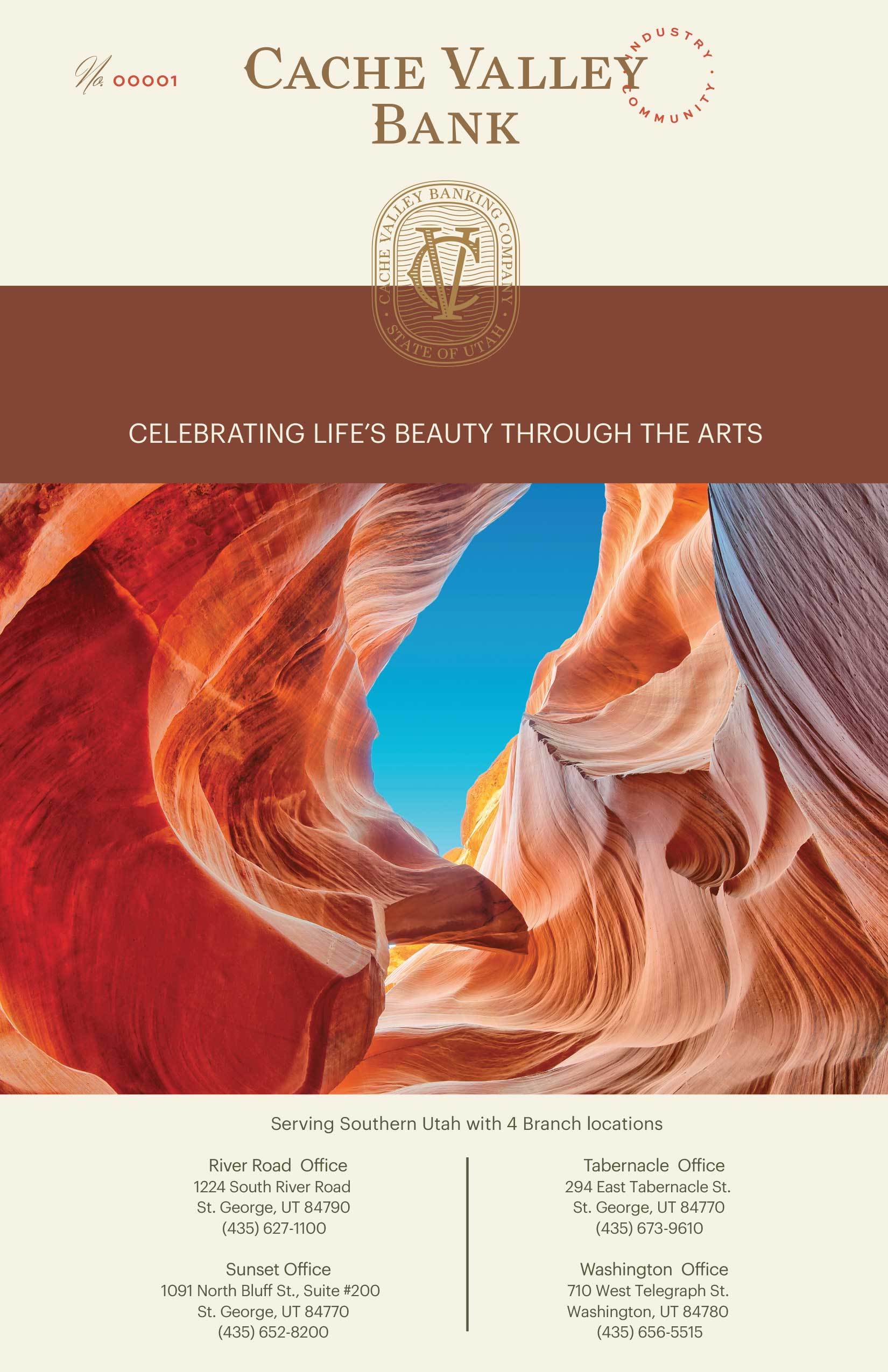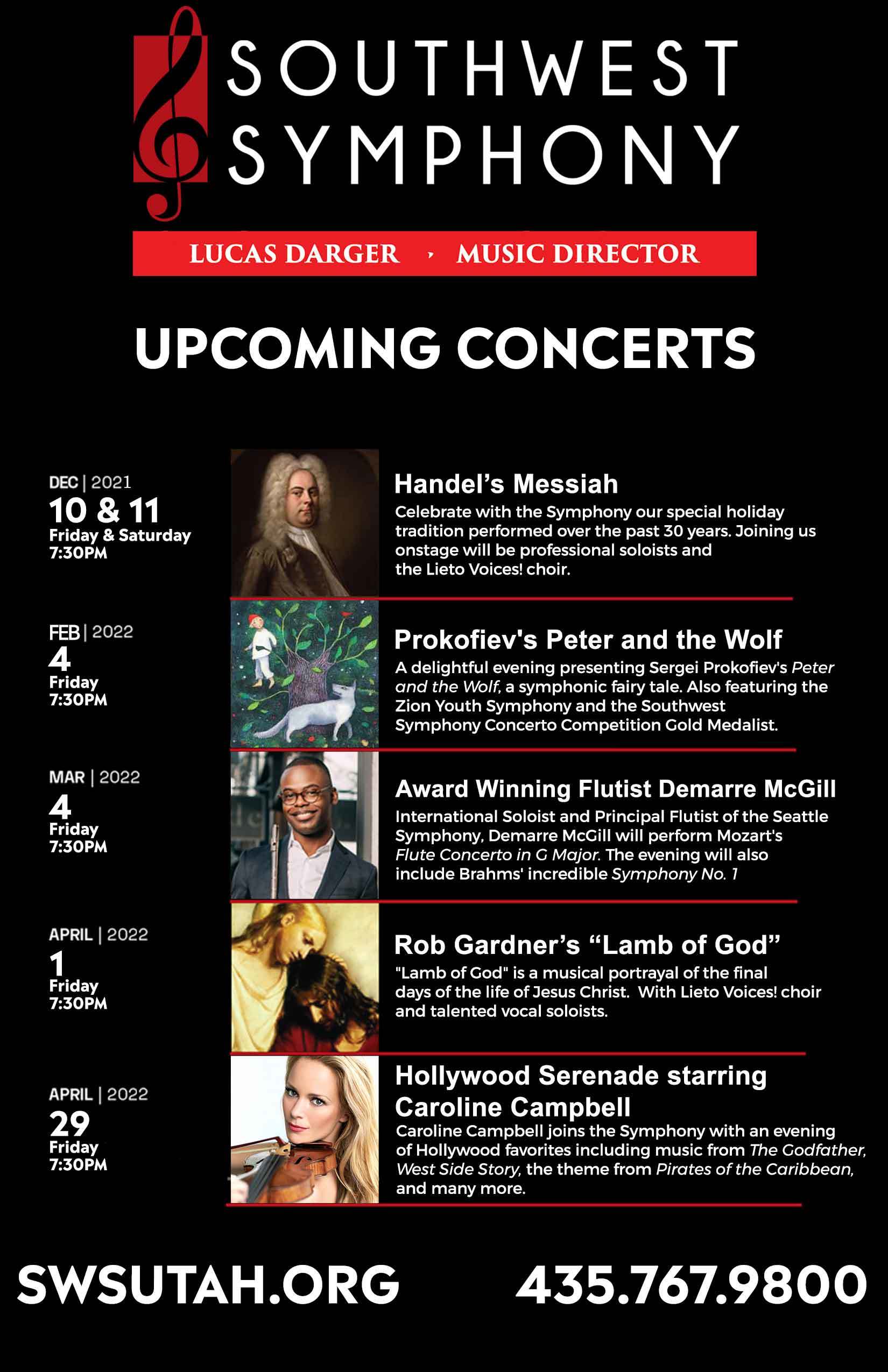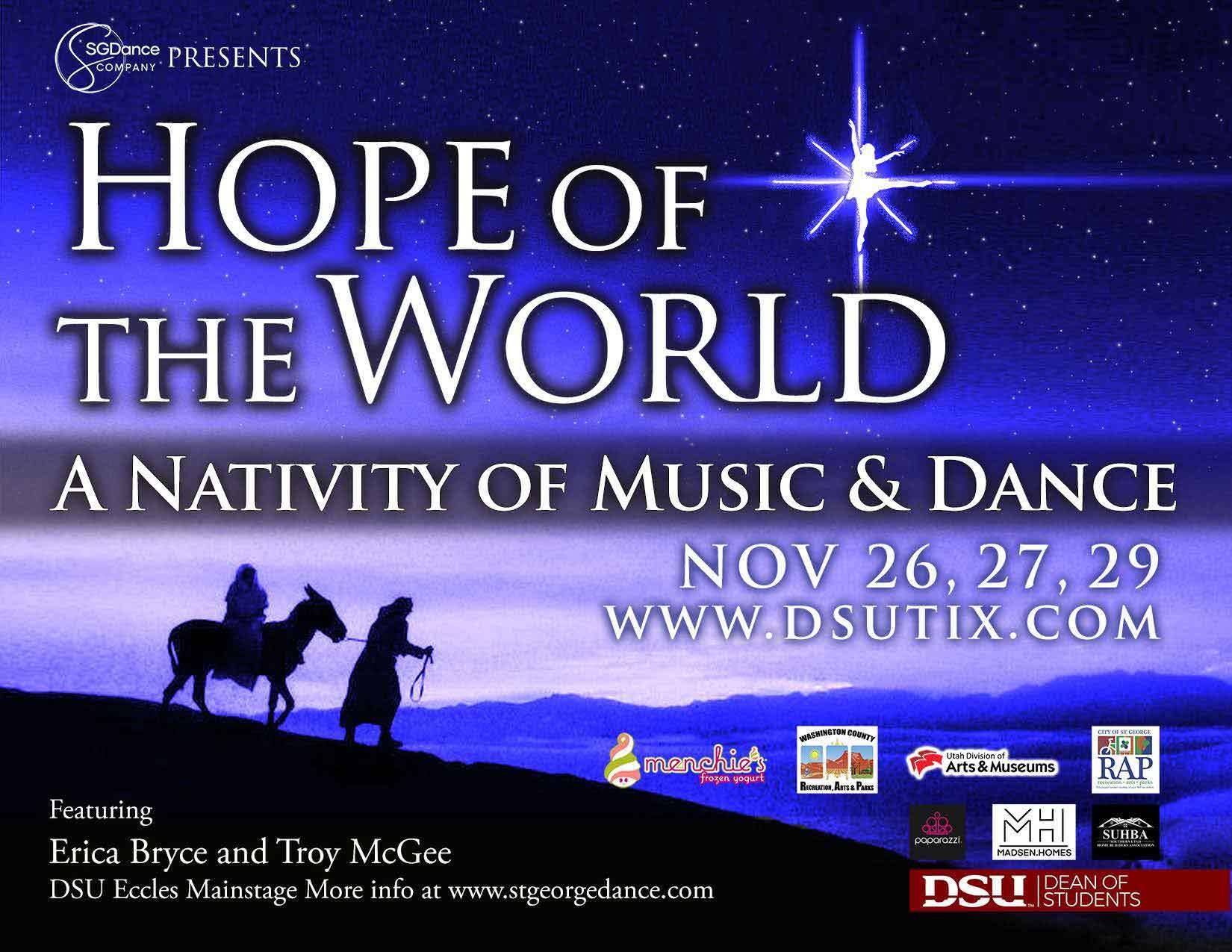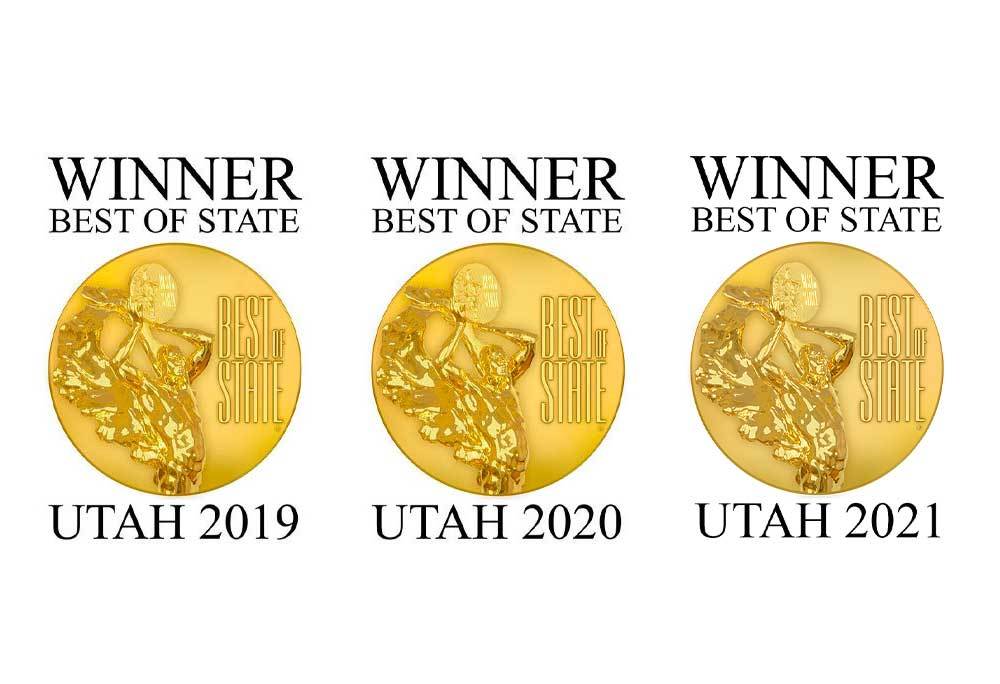Use Preferences to change the theme
Theme:
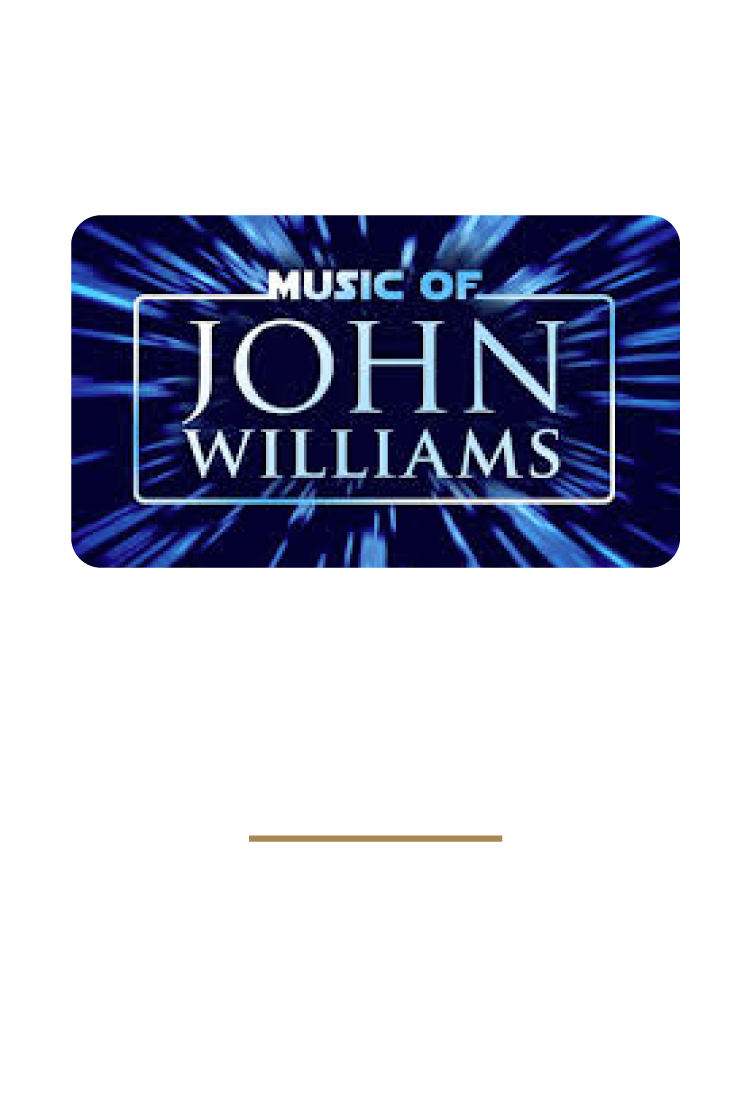
Thank you!

Follow us:
Tonight’s Program
Main Theme
from “Star Wars”
.......
Yoda’s Theme
from “Star Wars”
.......
Flying Theme
from “E.T.”
.......
Concert Suite
from “Harry Potter and the Goblet of Fire”
.......
Hymn to the Fallen
from “Saving Private Ryan”
.......
Main Theme
from “Jurassic Park”
Intermission
Cowboy’s Overture
.......
Sayuri’s Theme
from “Memoirs of a Geisha”
.......
Superman’s March
.......
Theme
from “Schindler’s List”
.......
Imperial March
from “Star Wars”
From the Board
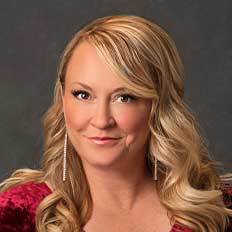
Alyce Gardner
Board Chair
Dear Friends,
We are standing on the precipice of a new age. As we have painfully learned over the past months with Covid-19, our way of life has been threatened. We have experienced grief, loss, sadness and isolation. The performing arts have been stripped from our culture excluding us from the enrichment humanity desires and needs.
Moving forward, redefining an unknown future is as difficult as living through the changing realities of today. As we stand in this moment of reassessment it’s imperative we assimilate the lessons learned. How do we confidently move forward in this global state of affairs? I suggest we unite in a spirit of gratitude. Because of Covid, I have rediscovered a profound depth of appreciation for music and what it means to my way of life. To me, it’s not an accessory but an integral part of my life which makes me whole. Music and the arts are not recyclable assets I pull off the shelf when I need an emotional impact. They are part of me and define so much of who I am.
I hope we don’t lose sight of the lessons learned, but embrace a new way of living with a deeper sense of gratitude for the beauty in the world around us. Each day is a gift. Cherish this time. Enjoy living in each joyful moment and let the music inspire you like never before.
Meet the Maestro
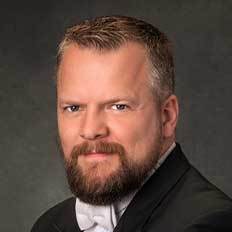
Lucas Darger
Now in his sixth year with the Southwest Symphony, Maestro Darger is honored to continue to work with this amazing group of musicians and be part of this community. Under his leadership the symphony has continued to take on even more difficult repertoire each year and has risen to the challenge. The orchestra performs very diverse repertoire, from the masterworks of Beethoven to the hits of Billy Joel, and in April 2021 the orchestra recorded a special for national TV with Marie Osmond.
Darger is a passionate conductor and musician and strives to achieve expressive performances that captivate and energize audiences. He began his journey with conducting when he was sixteen years old after being asked to assist with the All City Children’s Orchestra. He continued to study conducting while pursuing a degree in Violin Performance, studying with Dr. Robert Baldwin and conducting the Lincoln Youth Symphony. He went on to earn a master’s degree in orchestral conducting from the University of Iowa. There he studied with William LaRue Jones and conducted both the Philharmonic Orchestra and the UI String Orchestra while performing with Orchestra Iowa and the Dubuque Symphony Orchestra. He completed further studies with Michael Jinbo at the Pierre Monteux School for Conductors before moving to Texas, where he joined the Valley Symphony Orchestra and conducted the South Texas Youth Symphony.
Orchestra Members
Violin I
Rachel France, Concertmaster
Debbie Hafen, Assistant Concertmaster
Ahnalisse Gubler
Andrea Luikart
Amber Morris
Natalie Nelson
Debbie Thornton
Cassidee Torres
Julie Valadez
Kimberly Warburton
Violin II
Joie Whittaker, Principal
Lichelle Jones, Assistant Principal
Camille Allton
Amy Gray
Lauren Jess
Kristen Kjar
Cyndi Martin
Melanie Nielsen
Tammy Tremea
Viola
Linda Ghidossi-DeLuca, Principal
Shay Manley, Assistant Principal
Norman Fawson
Bella Isom
Kevin Lasnier
Dinah Nagel
April Olsen
Cello
Ka-Wai Yu, Principal
Peter Romney, Assistant Principal
Joe Duwel
Ann Evans
Sandy Gustaveson
Leslie Jack
Peggy Lambert
Kent McDonald
Mia Taylor
Debra Vradenburg
Bass
Denise Jones, Principal
Ed Candland
Amy Gardner
Harp
Jane Dastrup
Maggie Maxfield
Piano
Bailey Garcia
Piccolo
Cassey Flinders
Flute
Katrina Jones
Sandra Bodrero
Oboe
Kendyl Johnson
Tami Stillitoe
English Horn
Rhonda Rhodes
Clarinet
Melissa Bennion
Greg Johnston
Chris Flinders
Horn
David Lintz
Leslie Lintz
David Hay
Randy Bassuener
Tabitha Nygaard
Trumpet
Suzanne Czarnecki
LuWayne Barber
Sam Dickson
Jared Nicholson
Trombone
Timothy Francis
Steve Davis
Jay Nygaard
Tuba
Brad Stucki
Timpani
Ro Webb
Percussion
David Salisbury
Grace Palfreyman
Caitlyn Rollo
Larry White
Conductor
Lucas Darger
Music Librarian
Julia Monson
Lieto Voices! Choir Members
Suzanne Lewis
Milena Capriles
Elizabeth Brown
Lisa Hallows
Laura Shrout
Beverly Brimley
Kristina Reeder
Sherilyn Bennion
Carl Cutler
Brian Bennion
Kent Brown
Josh Jensen
Mark Evertsen
Roy Barker
Brad Flagmeier
Jim Brey
St. George Dance Company Dancers
McKenna Summerhays
Natalie Campbell
Bethany Gee
Paris Sullivan
Olivia Thomas
Rebekah Kaiser
Sara Reynolds
Reese Wheeler
Tucker Wall
Cooper Sullivan
Jaidyn Kae Orem
Program Notes
In 1927 a movie called The Jazz Singer created a technological breakthrough, allowing a recorded soundtrack to be synced with the movie on the film spool. With this invention an entirely new genre was created for movie-going audiences, allowing millions of people who had never been to a concert hall, an experience with classical music, bound in visual story lines.
This new medium created memorable movie and musical experiences for close to 100 years as dedicated film music became part the universal theater experience. Hollywood drew upon classically trained composers to provide the music for this new sound/visual medium. Countless memorable scores have paved the way for many great composers, with John Williams being the most recognized of them all.
John Williams (b. 1932, NY) is without a doubt, the most well-known and respected of these composers, and has produced such a varied and amazing body of film music that our entire concert is dedicated to his scores. To understand Williams’s impact, count the number of times you recognize a piece from this concert.
Williams was born to a middle-class background with music as an integral component to the family’s life. Williams was heavily influenced by his father performing in jazz bands in his spare time, playing drums and percussion.
In 1948, the family relocated to Los Angeles, with Hollywood being the center of the film scoring culture.
With his love of classical and jazz, and his new musical milieu, Williams embarked on a formal training period as he attended UCLA for musical composition, and Los Angeles City for its great jazz band. The Air Force recognized his talents when he joined in 1951 and gave him ample opportunity for composing, arranging, and performing with its dance bands and arranging for the main Air Force band. The Air Force support sent him on a trajectory for success by sending him to University of Arizona, where he furthered his formal training in composition. After leaving the Air Force in 1955, he attended Juilliard and the Eastman Schools of music, paying for his education by playing and arranging in NYC jazz clubs at night.
Williams returned to Hollywood where musicians of his caliber were desired for studio work and movie soundtrack recording. Here he worked with composers Frank Waxman, Elmer Bernstein, Bernard Hermmann, Jerry Goldsmith, and Henry Mancini. If you know where to look, you can hear Williams playing the piano on many of the great soundtracks of the day. “Johnny” also released several Jazz albums of his own during this time.
Williams’ first scores that were completely his own included adventure TV shows such as Lost in Space, The Time Tunnel, and Land of the Giants. Williams moved into original score production for feature length movies and received his first feature film Academy Award nomination for a very different kind of adventure, Valley of the Dolls in 1967. This would be the first of 52 Academy Award nominations. Irwin Allen, who worked with Williams in his TV years, chose him for The Poseidon Adventure and the Towering Inferno and another disaster epic, Earthquake, guided him towards the epic adventure genre. These were all successful projects that brought him to the attention of the young and budding film directors Steven Spielberg and George Lucas.
Beginning with Jaws (1975 Academy Award for Best Original Soundtrack), Williams composed some of the most memorable orchestral music of the 20th Century and was able to make his impact through a combination of techniques and skills. Indiana Jones, Harry Potter, and Darth Vader were all enhanced by unique music that will always be associated with them.
Let’s look to 1977’s Star Wars (Academy Award for Best Original Soundtrack, AFI Best Movie Soundtrack of all time) as an example.
First, in the tradition of classical composers Richard Strauss and Gustav Mahler, Williams used a big orchestra…really big. He used the famed London Symphony Orchestra, and its amazing brass section, for the soundtrack for Star Wars. The hundred musicians of the London Symphony perform together regularly and are sensitive to classical tone and balance. Next, like Richard Wagner, Williams used the concept of the leitmotif (a unique musical theme associated with a character or idea) for Leia, the Force, and Luke. Later, Darth Vader would get his own theme that overshadows them all. Another characteristic is the variety of composition styles used throughout the movie. The classical, heroic tradition used in the opening scene and the closing court scene are in direct contrast to the Cantina Bar music that drew upon Williams’ Jazz background.
Additionally, tonight we are featuring another aspect of Williams’ long career. While Williams was being the most requested Hollywood composer, he accepted the position as conductor of the famed Boston Pops Orchestra. He loved this opportunity since the Boston Pops could perform a greater variety of repertoire than most Symphony Orchestras. While in this position, Williams would arrange much of the music for the orchestra, including his own movie scores. This led Williams to adapt his film music and arrange it as unified orchestral “suites”, or combinations of pieces. It is these Williams original arrangements that the members of the symphony are excited to present for you this evening.
At 89, Williams has retired from performing and composing but has hinted, if the right movie comes his way, he may reconsider his retirement.
Though we can only share a small sampling of this great composer’s full portfolio, be prepared to be literally “blown away.”


